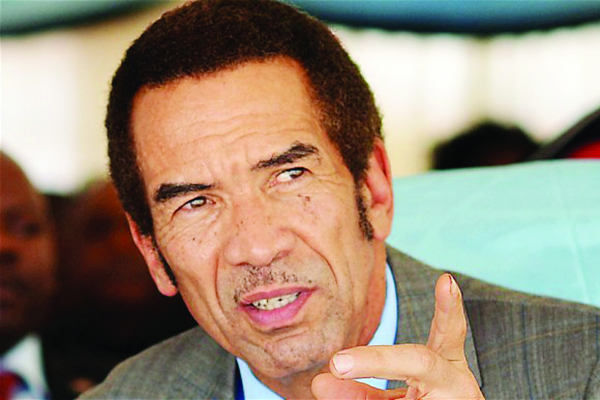
DESPITE their ideological differences, Botswana President Ian Khama and his Zimbabwean counterpart Robert Mugabe appear to have been hewn from the same block, in as far as their negative perception of the media is concerned, the Media Institute of Southern Africa (Misa) has revealed in its latest report.
BY OWN CORRSPONDENT
The two leaders have allowed their administrations to pass draconian media laws and kept a tight lead on information over government operations.
According to Misa’s 2017 annual transparency assessment report, it is almost as difficult to be a journalist under the Khama administration as it is under the Mugabe regime, because Botswana is almost as secretive as Zimbabwe.
In Botswana, eight government ministries and departments were surveyed on the ease with which information can be accessed. Of the eight only four score above the 50% pass mark.
In Zimbabwe, a total of 10 government institutions were surveyed, but only four made the 50% pass mark.
“Botswana is a very secretive country – out of eight organisations surveyed, only four responded to information requests. Release of information by public organs is regarded as a favour to the public,” the survey noted.
“Despite the recognition of the right to information by Section 12 of the Constitution and other public policy pronouncements, government bodies view any unsolicited request for information with suspicion. In fact, the survey found that Youth ministry public relations officers, who are supposed to be releasing information to the public, were instead attempting to block it.
- Chamisa under fire over US$120K donation
- Mavhunga puts DeMbare into Chibuku quarterfinals
- Pension funds bet on Cabora Bassa oilfields
- Councils defy govt fire tender directive
Keep Reading
“This year, on September 28, access to information in the context of development is taking the centre stage in global discussions on the achievement of the Sustainable Development Goals.
Access to information can facilitate an inclusive and informed debate on critical developmental issues; empowering citizens with a voice, a choice and control over decisions that directly impact their lives,” Misa Trust Funds board chairperson Luckson Chipare said.
“It is in this context that we raise awareness on every citizen’s right to information with our annual report, which celebrates progress made and cautions where development is still needed,” he said.
The assessment was jointly conducted by eight Misa national chapters and local researchers to determine the ease or difficulty with which citizens can access information held by public institutions in their respective countries.
The assessment reflects on the experience of researchers from Botswana, Malawi, Mozambique (Portuguese), Namibia, Swaziland, Tanzania, Zambia and Zimbabwe in their quest to exercise their right to information. The study establishes whether institutions make information pro-actively available via an online presence and provide useful information upon request.
With Tanzania and Malawi having adopted access to information laws in 2016, six countries in southern Africa now have a law guaranteeing their citizens a right to information. This positive trend in the adoption of access to information legislation needs to be accompanied by its effective implementation. The laws in Malawi and Tanzania have not yet been operationalised and Mozambique’s law, which was passed in December 2014, has not yet been fully implemented.
With e-governance becoming more prominent in Africa, institutions are increasingly making use of various online platforms to engage with the public, including social media. The release of useful information via websites has also improved; Malawi in particular has seen positive developments with regard to public bodies’ online presence, both in quality and quantity.
Acknowledging the importance of access to information and transparency for sustainable development, Misa continues to promote government openness in southern Africa and advocates for the adoption of legal frameworks guaranteeing the free flow of information.
With the positive developments in some countries’ public institutions, Misa hoped that the new standards set will be followed by other public entities.











